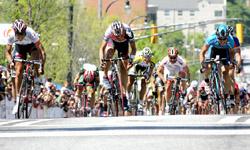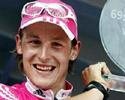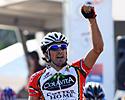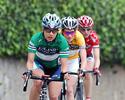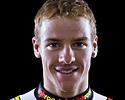Latest Cycling News, April 7, 2008Edited by Bjorn Haake Making the grade: Deciding Tour de Georgia invites
The Tour de Georgia recently announced the fifteen teams invited to take part in the sixth edition of the race. While there were not many surprises, the announcement of this and the other major North American races, such as the Tour of California, always comes with disappointment for some, elation for others and a bit of finger pointing - usually in the direction of Medalist Sports. The top two questions usually are, "Why them?" and "Why not more?" Cyclingnews' North American Editor Mark Zalewski spoke with Medalist Sports managing partner Jim Birrell and the team liaison for Medalist's events, Kevin Livingston, about the team invitation process. Shocking as it may be to some, the process for deciding which teams to invite to races such as the Tour de Georgia, Tour of Missouri and Tour of California is not made with a dart board - nor is it quite as complex as deciding the 64 teams for the NCAA college basketball tournament known as "March Madness" - it is somewhere in between. A lot of external factors go into the decision calculus, including UCI regulations, budget considerations and, frankly, the number of hotel rooms available to house the race. So while the UCI allows for up to 200 riders in a road race, it is not always as easy as that. "When you get up to the north Georgia mountains, housing is a premium," said Jim Birrell, managing partner of Medalist Sports and race director for the Tour de Georgia. "Cost is high, sure, but [there is limited] bed space, too. There just aren't many hotels there, period." This is one of the reasons why, after six years, the Tour de Georgia has added an additional day to its race, but not expanded beyond a limit of 15 teams for its peloton. But beyond simple supply and demand limitations of hotel space, the cost involved in bringing more teams gets rather high, and the cost-benefit curve begins to flatten out. Adding to the problem, the Tour de Georgia is still riding a thin margin in terms of budget and sponsors, running a deficit last year, even after signing AT&T as a title sponsor in the 11th hour. The costs of increasing the peloton also come in terms of safety, according to Birrell. "We have been very successful with a 15-team model, economically and from a safety point of view," he said. "If you have 15 teams that means 30 team cars in the caravan - if you increase the amount of teams you increase the length of the caravan, which gets more difficult to control." Indeed, a race caravan with 30 team cars, plus six official's vehicles, eight organisation vehicles, 10 police vehicles - oh, and 120 cyclists - takes up between two and three miles of road on a rolling enclosure. That's when the race is neutral. When a break goes up the road, the road closure envelope increases to five or six miles long. Trying to keep civilian traffic off the road before the race comes by, or out of the gap between the leaders and the peloton, is an immense challenge - especially in a country with a general population not known for its understanding of closing roads for a bicycle race. Read more on the difficulty of expanding the Tour de Georgia. Kemmelberg keeps kickingBy Gregor Brown in Gent
The Kemmelberg will keep on kicking in 2008 with its inclusion in the 70th Gent-Wevelgem despite multiple incidents last year. The race organiser has added a cobble section earlier in the race and modified the climb's approach to avoid the trouble seen when riders, including Frenchman Jimmy Casper, were injured on the high-speed descent. The Classic – won last year by German Marcus Burghardt and including famous past winners such as Eddy Merckx and Rik Van Looy – will start in Deinze (just southwest of Gent) this Wednesday at 11:30 and travel to Wevelgem, covering 209 kilometres in its journey. It is in the finale that the Kemmelberg (south of Ieper) strikes two times – kilometre 148 and 172 – making the race a credible Classic and preventing what would otherwise be an all-out bunch sprint on the Vanackerestraat. The first change comes with the introduction of the Steenstraat ('stone road' in English) at kilometre 49. It is a 2500-metre run that organisers hope will spread out the peloton for the latter portions of the race. The parcours won't take in much of Belgium's coast like in 2007. Instead, it will head straight for De Panne, avoiding the southward run from Oostende. Once near De Panne, the route turns left for Belgium's southwest corner, past the feed-zone in Poperinge and onto the village of Kemmel (km 146 & 170) for the start of the Kemmelberg. Check out the full preview of the next Belgian semi-classic. Redlands winners crownedBorrajo sprints to victory while Botero takes overallBy Kirsten Robbins
Rock Racing had their hands full in the final and most demanding stage of the Redlands Classic on the Sunset circuit race. The Colombian Santiago Botero, former world time trial champion, brought his lime and black clad-team the overall win, ahead of Chris Baldwin (Toyota-United) and Burke Swindlehurst (Bissell). Colavita/Sutter Home presented by Cooking Light stretched their legs on the final five short circuits to bring their Argentinean sprinter Alejandro Borrajo in position to take the stage victory from a diminished thirty-rider field. Borrajo sprinted ahead of Tony Cruz (BMC) and Rory Sutherland (Health Net). Overall race winner Santiago Botero commented on his team's performance in controlling the peloton over the Sunset circuit's twelve laps as a gesture of solid teamwork. "Without my team there would be no win," said Botero regarding his 2008 Rock Racing team-mates. "I am really happy to have won my first stage race in the USA and grateful to all of the work my team did to achieve this," continued Botero, who took over the leader's jersey after his stage one solo victory in Beaumont. "I knew that I had to gain time on the first stage and hold it in the stage two criterium and today's stage three because it would be easier for us to maintain the lead [by] my setting tempo and staying safe each day. I noticed that the teams here at this race were very strong and it was not easy for us here." Stage winner Alejandro Borrajo noted that the circuit's grueling climb and technical, fast descent matched perfectly to his ability as a rider of attrition with a speedy finishing kick. "I really liked the circuit today and I knew I could do well here today," said Borrajo. "My team executed our plan to win the stage perfectly," continued Borrajo, regarding his team's effort in winning the overall team competition by keeping their numbers high for the end of the race. "I tried to attack on the last lap of the big loop but it did not stay away; but with five of my team-mates still in the front group, they gave me a perfect lead-out to the line. I'd really like to thank John O'Connelly for inviting my team to stay with him in Santa Rosa to prepare for this event together." More on the men's race in Robbins' report of the final stage. Wrubleski takes it all
Webcor's former Canadian national champion Alex Wrubleski slowly picked away at the time bonus sprints to claim the overall victory in the Redlands Classic. Wrubleski sealed the overall lead after she won the final sprint in the Sunset circuit race to take the ultimate stage victory ahead of Leigh Hobson (Cheerwine) and Kim Anderson (High Road). Current US national road champion Mara Abbott led the Redlands classic with a twenty-five second cushion after the Sun prologue. However, after a tactical battle through the final stage, Wrubleski earned the necessary twelve seconds needed to overtake Abbott for the overall win, while Katharine Carroll (Aaron's) maintained her third place position. While using her sprint to pick up time bonuses, Wrubleski captured enough points to solidify her lead in both the points and QOM jerseys. "We were definitely the underdogs after the prologue," said triple jersey winner Alex Wrubleski. "So we knew it wasn't going to be impossible to win the overall but that it would be hard. I also knew that Mara was a really good climber but after the first climbing stage I was pretty sure that I was really close to Mara in terms of climbing ability. Because I knew that she wouldn't be able to get away from me on the climbs, our plan was to have me slowly pick away at all the time bonuses everyday and keep moving ahead on GC." While Abbott expressed her disappointment in coming up short on seconds, she commended her team on their effort to hold onto the leader's jersey. "My team was amazing this week, they did everything perfectly," said Abbott. "It comes down to seconds some times in these races and unfortunately I wasn't able to get enough of those in the right places. I love Redlands and I'm looking forward to this race next year." The full women's report is available. Hansen's visit to Hel, Martin's first High Road winBy Susan Westemeyer
Adam Hansen has seen hell, and he doesn't like it. The Australian on Team High Road probably would prefer traditional heat and flames over the rain and cold of the Hel van het Mergelland ('hell of Mergelland') Saturday. Together with young team-mate Tony Martin, he took off early in the race and the pair was able to stay away until the end. And in the end, he let Martin go over the finish line first. "The race was good, but too cold for me and that's what got me in the end," he told Cyclingnews. "I couldn't change gears or even brake, so with the last 30 kilometres [remaining] I went rather bad. Tony asked how we should do it and I said he could have it [the victory]. If I had dressed better then I would have felt a lot better, but as the day went on it was really bad for me. It was like my hands were taped up and I couldn't do anything." It was Martin's first victory for Team High Road. The 22 year-old was racing well in the U23 category in the last couple of years for Team Energie Thühringer. He was waiting to become professional until his studies were complete. Now he can fully concentrate on his road cycling career. Before the season, Martin said he wouldn't imagine winning much for himself, instead helping out the team. But with the two-man break clear, Hansen and Martin had to figure out the placing one way or the other. The Australian explained that "we went hand on hand [up to the finish] and I gave him a bit of a push just before the line. He needs the win more than I do." Hansen concluded that "it doesn't really matter in my eyes who wins, we are from the same team." Antón in, Pérez out of País VascoBy Monika Prell Euskaltel – Euskadi has confirmed today its team for the Vuelta al País Vasco that will start Monday in Legazpi (Gipuzkoa). As the team confirmed to Cyclingnews, Igor Antón will participate after a long break due to some problems he had with his Achilles tendon since Paris – Nice. Together with Mikel Astarloza, Antón will be one of the Basque team's leaders in its home race. The bad news is that another strong rider, Rubén Pérez, will not be able to be at the start in Legazpi. He suffers from influenza, which prevents him from participating in a race of the importance of a Vuelta al País Vasco. He will be replaced by the young Iván Velasco. The entire team will consist of the leaders Mikel Astarloza and Igor Antón, the sprinter Ińaki Isasi, the strong riders Ińigo Landaluze, Egoi Martínez and Amets Txurruka, who also could try to reach a good overall classification, and the young riders Jorge Azanza and Iván Velasco, who already showed that they are two of the team's future hopes. Coupe de France, round threeThe Grand Prix de la ville de Rennes was host to a 195.7-kilometre race that formed part of the Coupe de France, which runs through the entire French season. Rennes was location of the third round, with victory taken by the Ukrainian Mikhaylo Khalilov (Ceramica Flaminia-Bossini Docce) in a solo effort. He saved four seconds ahead of the main field, which was led home by Sébastien Chavanel (Française des Jeux). Third-place finisher Jimmy Casper (Agritubel) was able to get the lead in the Coupe de France. Only French riders or riders riding for a French team will get points towards the series classification. Casper has now 39 points and a four-point lead over Chavanel and Italian Rinaldo Nocentini (Ag2r-La Mondiale). Chavanel took the maximum 35 points, with winner Khalilov receiving 0 points for not being French and not riding for a French team. Aurélien Clerc (Bouygues Telecom) and Emilien-Benoît Berges (Agritubel) were following in fourth and fifth, with 26 and 25 points collected, respectively. The American outfit Slipstream Chipotle Presented By H30 also took part in the race, with Australian Christopher Sutton managing a 12th place. Gerolsteiner and Volksbank for SartheTeams Gerolsteiner and Volksbank are looking forward to the Circuit Cycliste Sarthe this week, a four-day race over 666.2 kilometres. The German ProTour team hopes to repeat its past successes in the race. Sprinter Robert Förster, who won the sprinter's jersey in the race last year, will lead the team. He will have support by, among others, Markus Zberg, who finished ninth overall last year. Stefan Schumacher, who is not riding the race this year, won it in 2006 with the tightest of margins, being equal on time with runner-up Serguei Gonchar. The Austrian Professional Continental Team Volksbank noted that the race consists of 16 teams with six riders each. "That will be exciting, because unlike races with eight starters, the race can't be controlled by the top teams," said Directeur Sportif Gregor Gut. The team will go for stage wins, with Andreas Dietziker looking to the nine-kilometre time trial. Gerolsteiner for Sarthe: Francesco De Bonis, Robert Förster, Johannes Fröhlinger, Mathias Frank, Ronny Scholz and Markus Zberg. Volksbank for Sarthe: Andreas Dietziker, Gerrit Glomser, Philipp Ludescher, Daniel Musiol, Florian Stalder and René Weissinger. David Belda wins Memorial ValenciagaDavid Belda, ex–professional with Fuerteventura Canarias, has won yesterday's 37th edition of the Memorial Valenciaga. This race is considered one of the most important amateur races in Spain. It was won by riders who went on to become professionals in the following season, like once Julian Górospe, Óscar Freire, Unai Osa or Dioni Galparsoro. David Belda, the son of Vicente Belda, sports director of the team Fuerteventura Canarias, had become professional in this team in 2007. The 25 year-old did not find another team when Fuerteventura Canarias stopped its operation as a Continental team at the end of 2007, and so finally he followed his father to the amateur team of Fuerteventura Canarias. After having won the Klasika Aiztondo, he also raised his hands in celebration after the 163.2 kilometers of the Memorial Valenciaga, disputed in Eibar. He formed part of a breakaway group with several others, including Andrey Amador, who was one of the favourites to victory. Amador already has a pro contract with Caisse d'Epargne for next season. 200 metres before the finish, Belda accelerated and Amador was not able to follow him. According to Gara, Belda was overhappy to have won "the best race of Spain, we all want to win it. I always liked to participate in it." Now, David Belda hopes that "this race helps me to return to the pros. I had already an oral promise of one team, but in the end, it didn't work. But this is my life, it's what I like to do and I have to try it," commented Belda. Hans wins CadolzburgThe race around the Cadolzburg in Germany is a mini-Flanders, with short sections of cobbles, a steep climb, many spectators and the unpredictable weather. This year's edition was won by Sebastian Hans from Team Mapei-Heizomat. It was Hans' first victory for the team in blue. The strong showing of Mapei-Heizomat was completed by Christoph Schwerdt and Florian Völk in fifth and sixth, respectively. The race went over seven laps of 21.6 kilometres, for a total of 151.2 kilometres. It started out in cool and rainy conditions. Mapei-Heizomat was trying to get the win to Schwerdt, who is the local boy on the team, coming from near-by Nürnberg. Schwerdt, Völk and Hans made the ten-man break that peeled off the peloton midway through the race. At the end of the last lap a five-man break developed with Schwerdt, Hans, Martin Hebik (Team Sparta Prag), Dutchman Malya van Ruitenbeek (Team Kuota-Senges) and Tobias Erler (3C-Gruppe). The quintet took 30 seconds going into the last lap of 21.6 kilometres. Hans was able to win the sprint ahead of Hebik, van Ruitenbeek, Erler and Schwerdt. The chasers were led home by Völk. His directeur sportif, Markus Schleicher, was impressed. "A respectable performance, considering he is only 19 and can not train as much, due to his education." But Schleicher was overall a happy man. "I am very happy with the performance of the whole team." Robert Retschke of Mapei-Heizomat was 11th, winning the sprint of the main peloton, with team-mate Kim Lachmann in 13th. (Additional reporting and research provided by Monika Prell and Susan Westemeyer.) Previous News Next News (All rights reserved/Copyright Future Publishing Limited 2008) |

|
January 2009 |
Recently on Cyclingnews.com |

